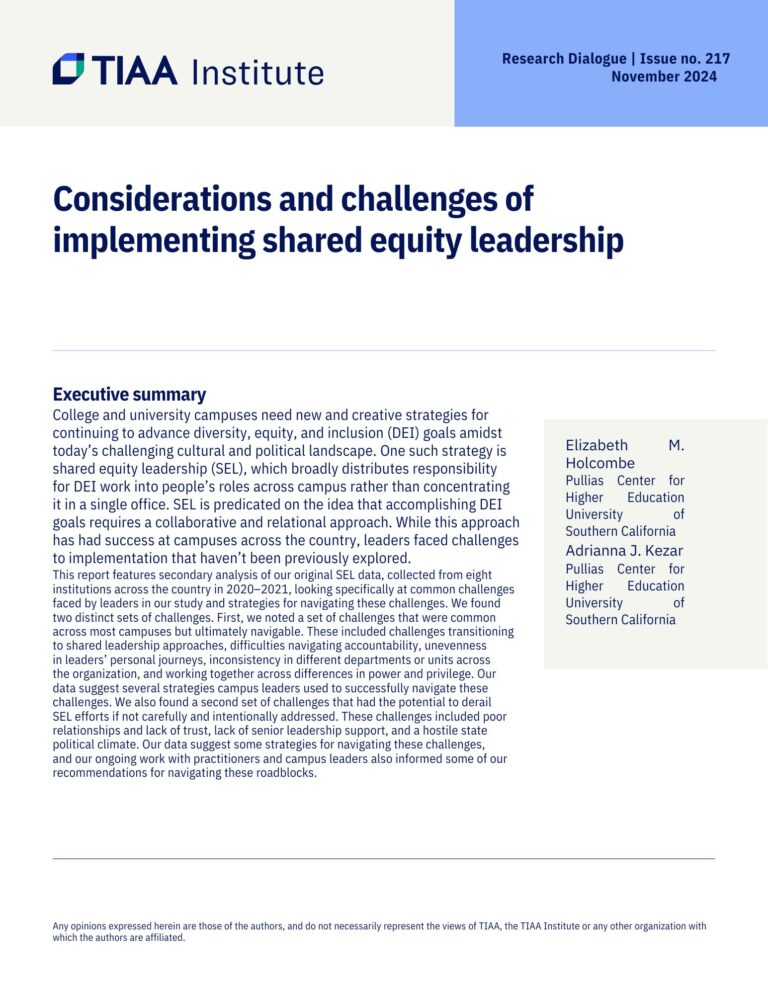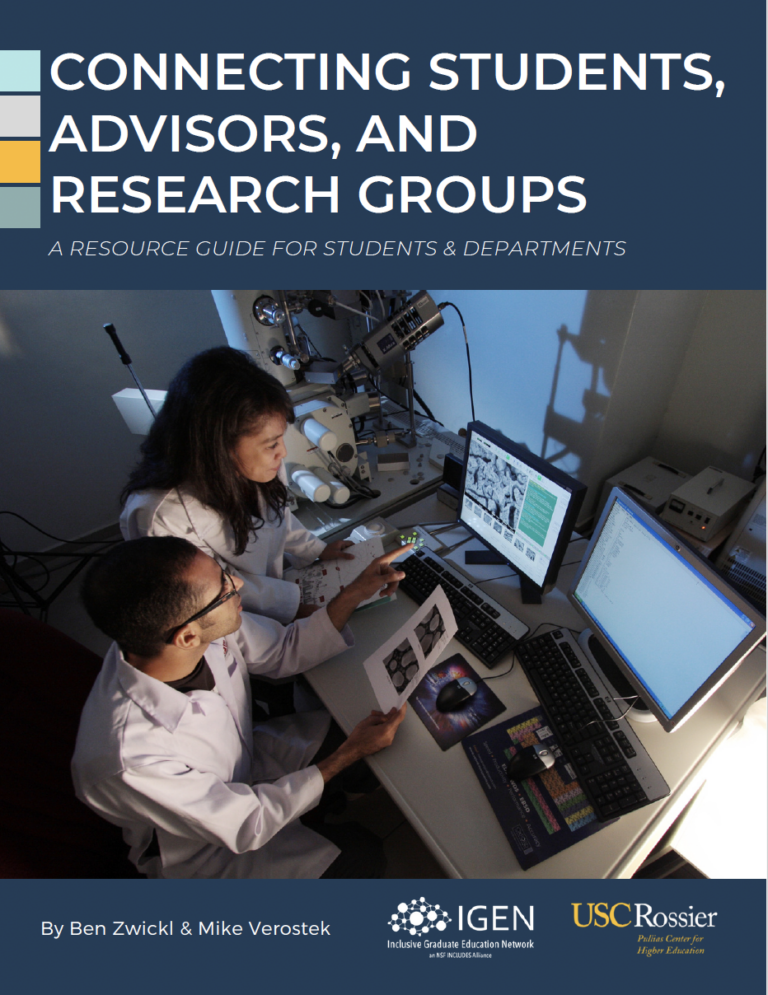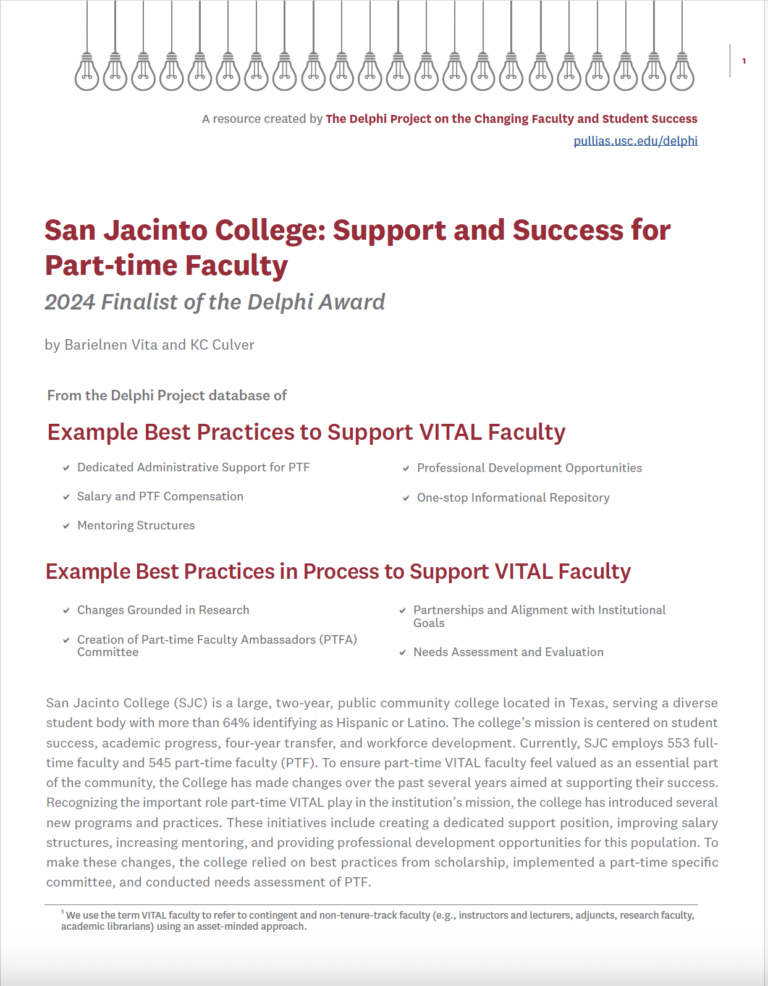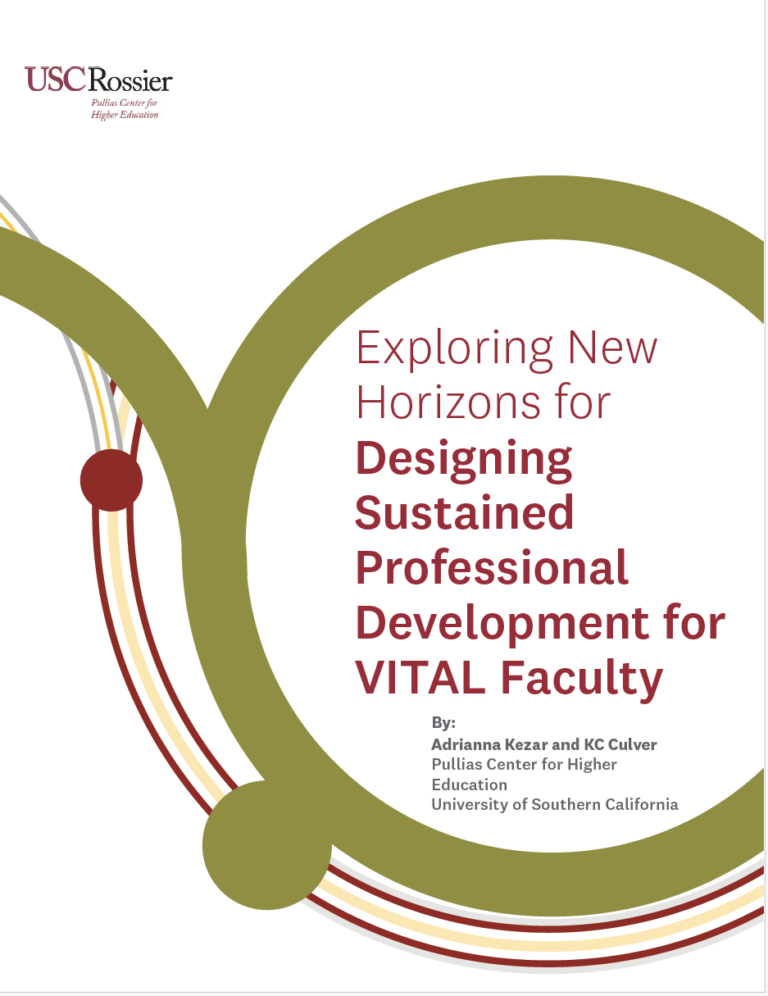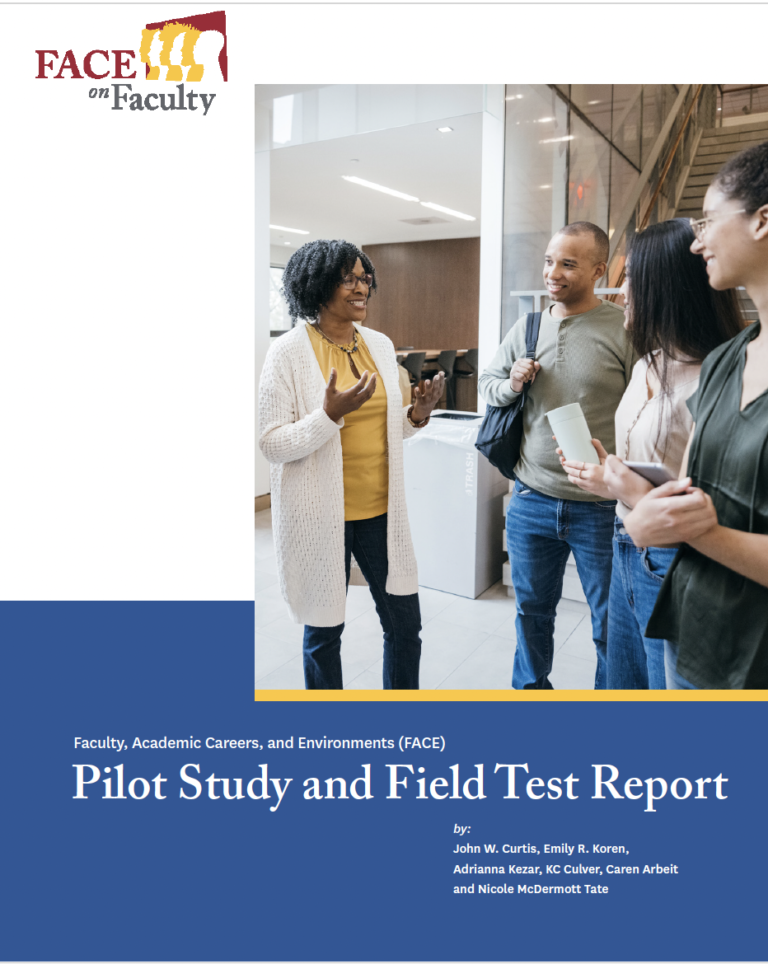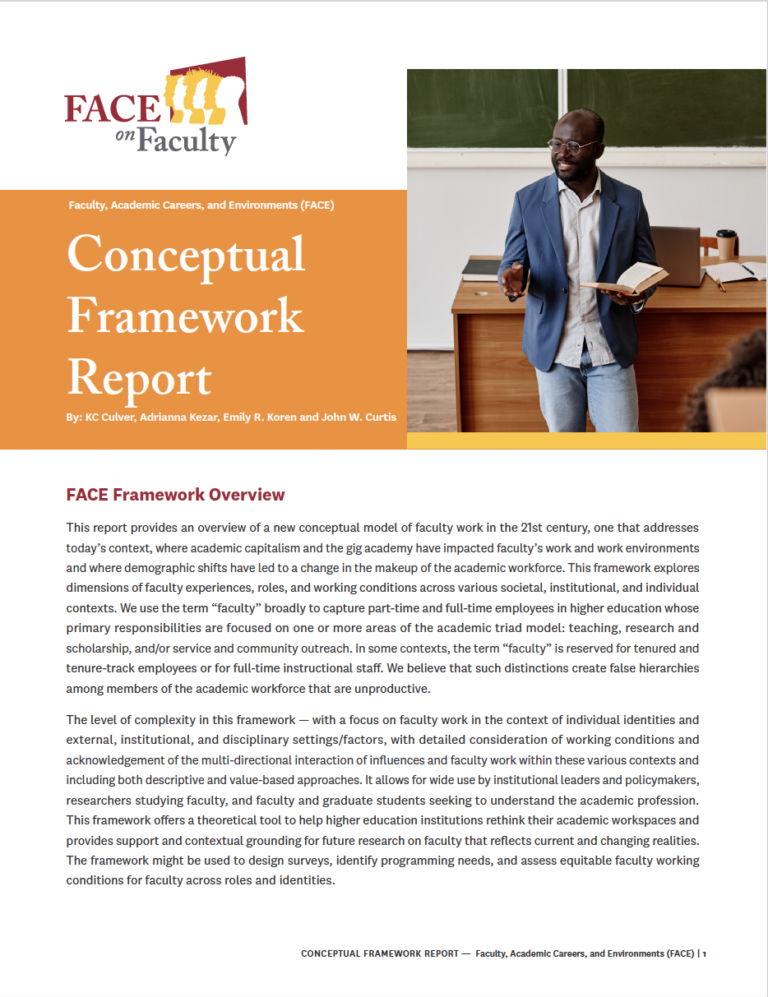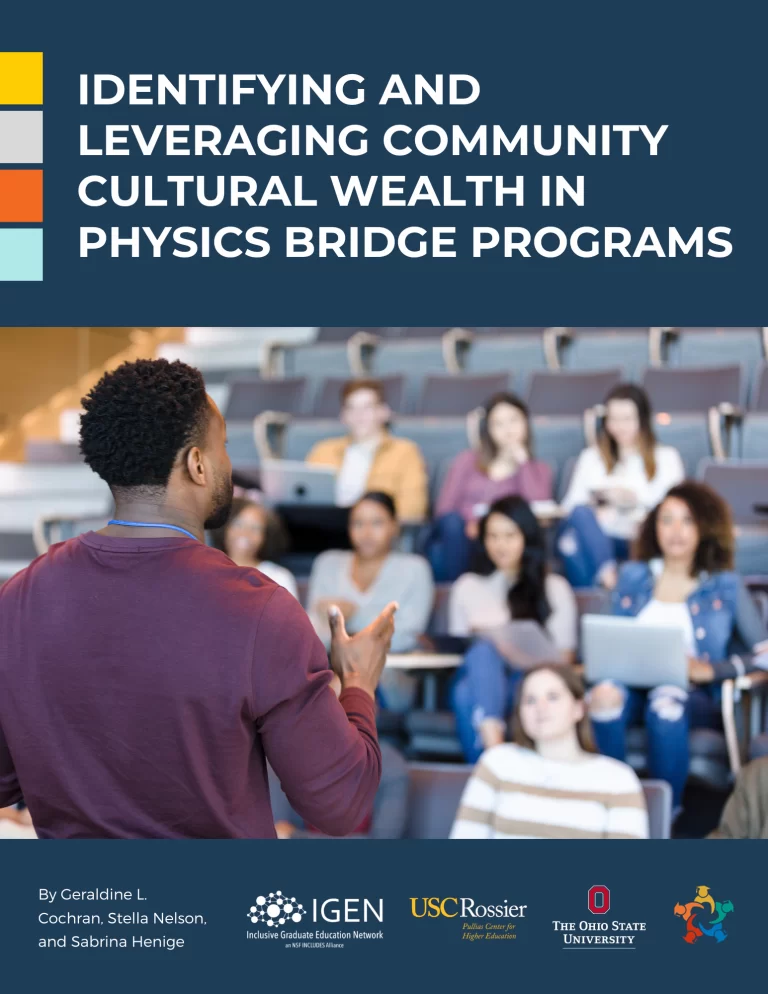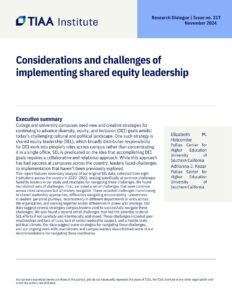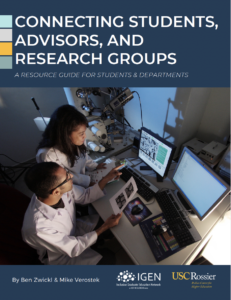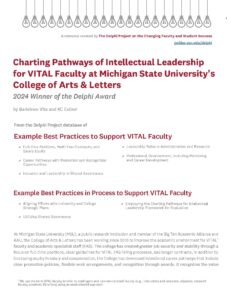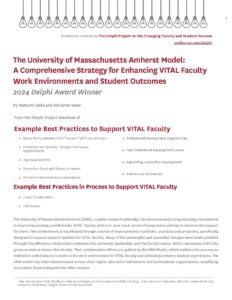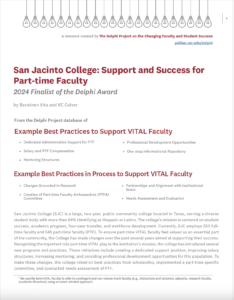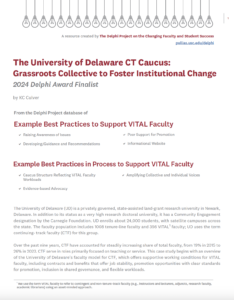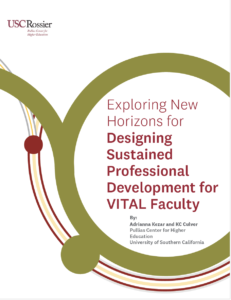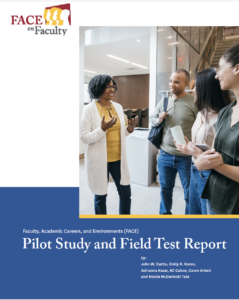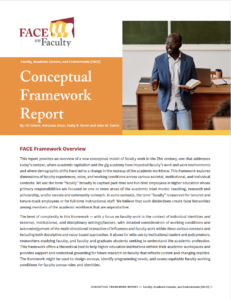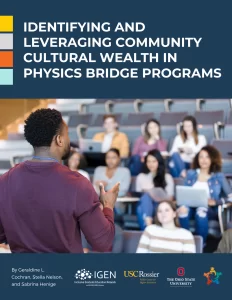Publications
Since 1995, the Pullias Center has engaged in action-oriented projects and research to improve college access and student success, promote equity and diversity, and enhance the performance of postsecondary institutions. The Pullias Center publishes a range of reports, guides, briefs, tool kits and more informed by this higher education research. We have created more than 150 publications and all are free to download here.
For journal articles and book chapters authored by our faculty, please visit their individual pages.
Considerations and Challenges of Implementing Shared Equity Leadership
Elizabeth Holcombe and Adrianna Kezar
TIAA Institute (2024)
College and university campuses need new and creative strategies for continuing to advance diversity, equity, and inclusion (DEI) goals amidst today’s challenging cultural and political…
Connecting Students, Advisors and Research Groups — A Resource Guide for Students and Departments
Ben Zwicki & Mike Verostek
Pullias Center for Higher Education (2024)
This guide was developed from recently conducted research on the importance of structured support in STEM PhD programs. The project, led by Drs. Ben Zwickl…
Charting Pathways of Intellectual Leadership for VITAL Faculty at Michigan State University’s College of Arts & Letters
Barielnen Vita and KC Culver
Delphi Award Winner, 2024
At Michigan State University (MSU), a public research institution and a member of the Big Ten Academic Alliance and AAU, the College of Arts &…
The University of Massachusetts Amherst Model: A Comprehensive Strategy for Enhancing VITAL Faculty Work Environments and Student Outcomes
Natsumi Ueda and Adrianna Kezar
Delphi Award Winner, 2024
The University of Massachusetts Amherst (UMA), a public research university, has demonstrated a long-standing commitment to improving working conditions for VITAL faculty with a 20-year…
San Jacinto College: Support and Success for Part-time Faculty
Barielnen Vita and KC Culver
Delphi Award Finalist, 2024
San Jacinto College (SJC) is a large, two-year, public community college located in Texas, serving a diverse student body with more than 64% identifying as…
The University of Delaware CT Caucus: Grassroots Collective to Foster Institutional Change
KC Culver
Delphi Award Finalist, 2024
Over the past nine years, CTF have accounted for steadily increasing share of total faculty, from 19% in 2015 to 26% in 2023. CTF serve…
Exploring New Horizons for Designing Sustained Professional Development for VITAL Faculty
Adrianna Kezar and KC Culver
Pullias Center for Higher Education (2024)
This report analyzes the design process that campus teams use to create sustained professional development (SPD) programs such as faculty learning communities for VITAL faculty.…
Faculty, Academic Careers, and Environments (FACE) Pilot Study and Field Test Report
John W. Curtis, Emily R. Koren, Adrianna Kezar, KC Culver, Caren Arbeit and Nicole McDermott Tate
Pullias Center for Higher Education (2024)
This report describes the two-year pilot study of how best to create a national study of faculty working at non-profit colleges and universities of all…
Faculty, Academic Careers, and Environments (FACE) Conceptual Framework Report
KC Culver, Adrianna Kezar, Emily R. Koren and John W. Curtis
Pullias Center for Higher Education (2024)
The purpose of the Faculty, Academic Careers and Environments (FACE) project is to understand who faculty are, what their academic careers look like, and how…
Identifying and Leveraging Community Cultural Wealth in Physics Bridge Programs
Geraldine L. Cochran, Stella Nelson, and Sabrina Henige
Pullias Center for Higher Education (2024)
Nudging the culture of STEM graduate programs, so they are more inclusive of students from racially minoritized backgrounds, can help address inequities in access and…
Considerations and Challenges of Implementing Shared Equity Leadership
Elizabeth Holcombe and Adrianna Kezar
TIAA Institute (2024)
College and university campuses need new and creative strategies for continuing to advance diversity, equity, and inclusion (DEI) goals amidst today’s challenging cultural and political landscape. One such strategy is shared equity leadership (SEL), which broadly distributes responsibility for DEI…
Connecting Students, Advisors and Research Groups — A Resource Guide for Students and Departments
Ben Zwicki & Mike Verostek
Pullias Center for Higher Education (2024)
This guide was developed from recently conducted research on the importance of structured support in STEM PhD programs. The project, led by Drs. Ben Zwickl & Mike Verostek, highlights the challenges students face — whether they are exploring their research…
Charting Pathways of Intellectual Leadership for VITAL Faculty at Michigan State University’s College of Arts & Letters
Barielnen Vita and KC Culver
Delphi Award Winner, 2024
At Michigan State University (MSU), a public research institution and a member of the Big Ten Academic Alliance and AAU, the College of Arts & Letters has been working since 2016 to improve the academic environment for VITAL faculty and…
The University of Massachusetts Amherst Model: A Comprehensive Strategy for Enhancing VITAL Faculty Work Environments and Student Outcomes
Natsumi Ueda and Adrianna Kezar
Delphi Award Winner, 2024
The University of Massachusetts Amherst (UMA), a public research university, has demonstrated a long-standing commitment to improving working conditions for VITAL faculty with a 20-year track record of progressive policies to improve the support for them. This commitment is manifested…
San Jacinto College: Support and Success for Part-time Faculty
Barielnen Vita and KC Culver
Delphi Award Finalist, 2024
San Jacinto College (SJC) is a large, two-year, public community college located in Texas, serving a diverse student body with more than 64% identifying as Hispanic or Latino. The college’s mission is centered on student success, academic progress, four-year transfer,…
The University of Delaware CT Caucus: Grassroots Collective to Foster Institutional Change
KC Culver
Delphi Award Finalist, 2024
Over the past nine years, CTF have accounted for steadily increasing share of total faculty, from 19% in 2015 to 26% in 2023. CTF serve in roles primarily focused on teaching or service. This case study begins with an overview…
Exploring New Horizons for Designing Sustained Professional Development for VITAL Faculty
Adrianna Kezar and KC Culver
Pullias Center for Higher Education (2024)
This report analyzes the design process that campus teams use to create sustained professional development (SPD) programs such as faculty learning communities for VITAL faculty. This report can be useful for educational developers and others who plan sustained professional development…
Faculty, Academic Careers, and Environments (FACE) Pilot Study and Field Test Report
John W. Curtis, Emily R. Koren, Adrianna Kezar, KC Culver, Caren Arbeit and Nicole McDermott Tate
Pullias Center for Higher Education (2024)
This report describes the two-year pilot study of how best to create a national study of faculty working at non-profit colleges and universities of all types across the country, given the social media and survey research environment of the 2020s.
Faculty, Academic Careers, and Environments (FACE) Conceptual Framework Report
KC Culver, Adrianna Kezar, Emily R. Koren and John W. Curtis
Pullias Center for Higher Education (2024)
The purpose of the Faculty, Academic Careers and Environments (FACE) project is to understand who faculty are, what their academic careers look like, and how the environments in which they work shape their ability to thrive as instructors, researchers and…
Identifying and Leveraging Community Cultural Wealth in Physics Bridge Programs
Geraldine L. Cochran, Stella Nelson, and Sabrina Henige
Pullias Center for Higher Education (2024)
Nudging the culture of STEM graduate programs, so they are more inclusive of students from racially minoritized backgrounds, can help address inequities in access and degree completion in the STEM disciplines. This research-based guide is designed to help departments begin…
University of Southern California
3470 Trousdale Parkway
Waite Phillips Hall, WPH 701
Los Angeles, California 90089-4037
Phone: 213-740-7218
Email: pullias@usc.edu
Get timely updates on higher ed news & research!
By submitting this form, you are consenting to receive marketing emails from the Pullias Center for Higher Education. You can revoke your consent to receive emails at any time by using the SafeUnsubscribe® link, found at the bottom of every email. Emails are serviced by Constant Contact


